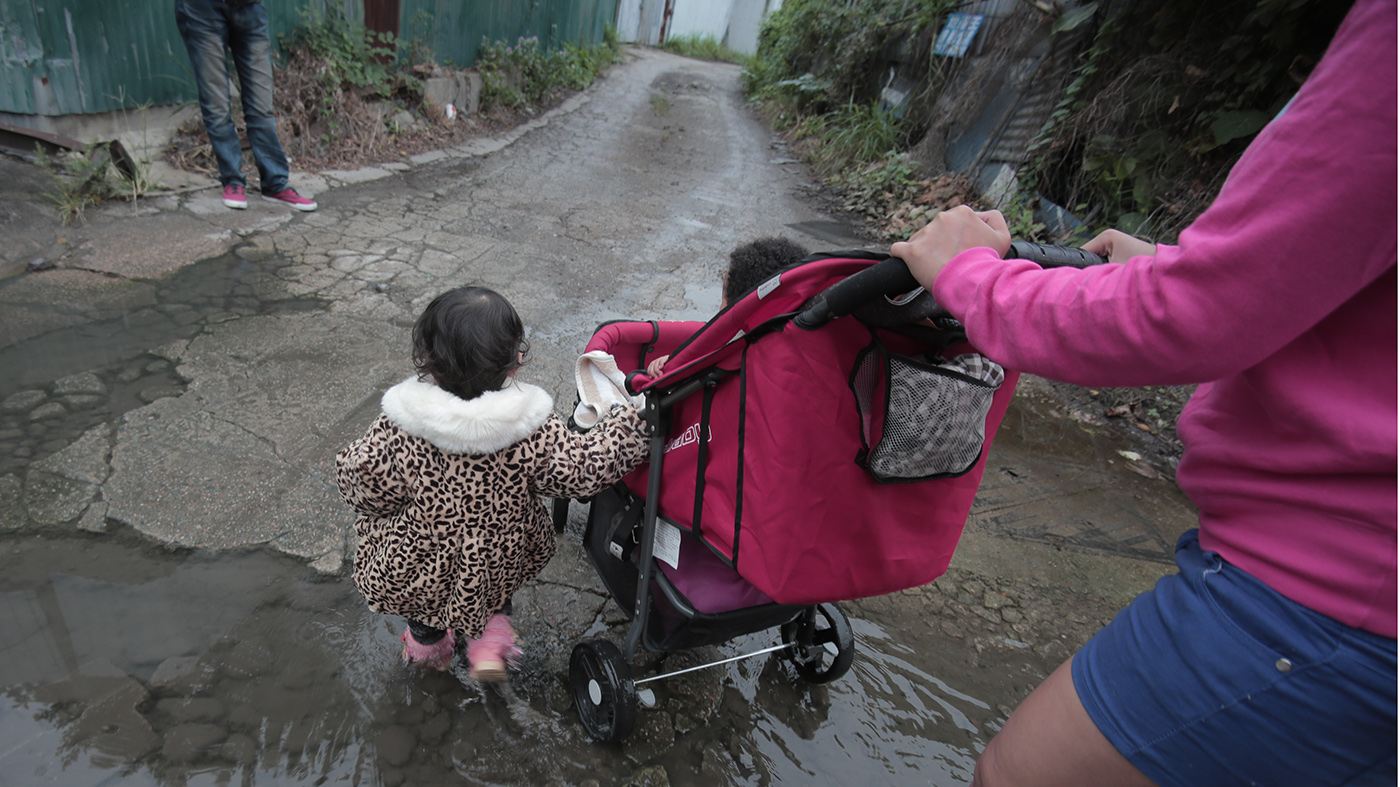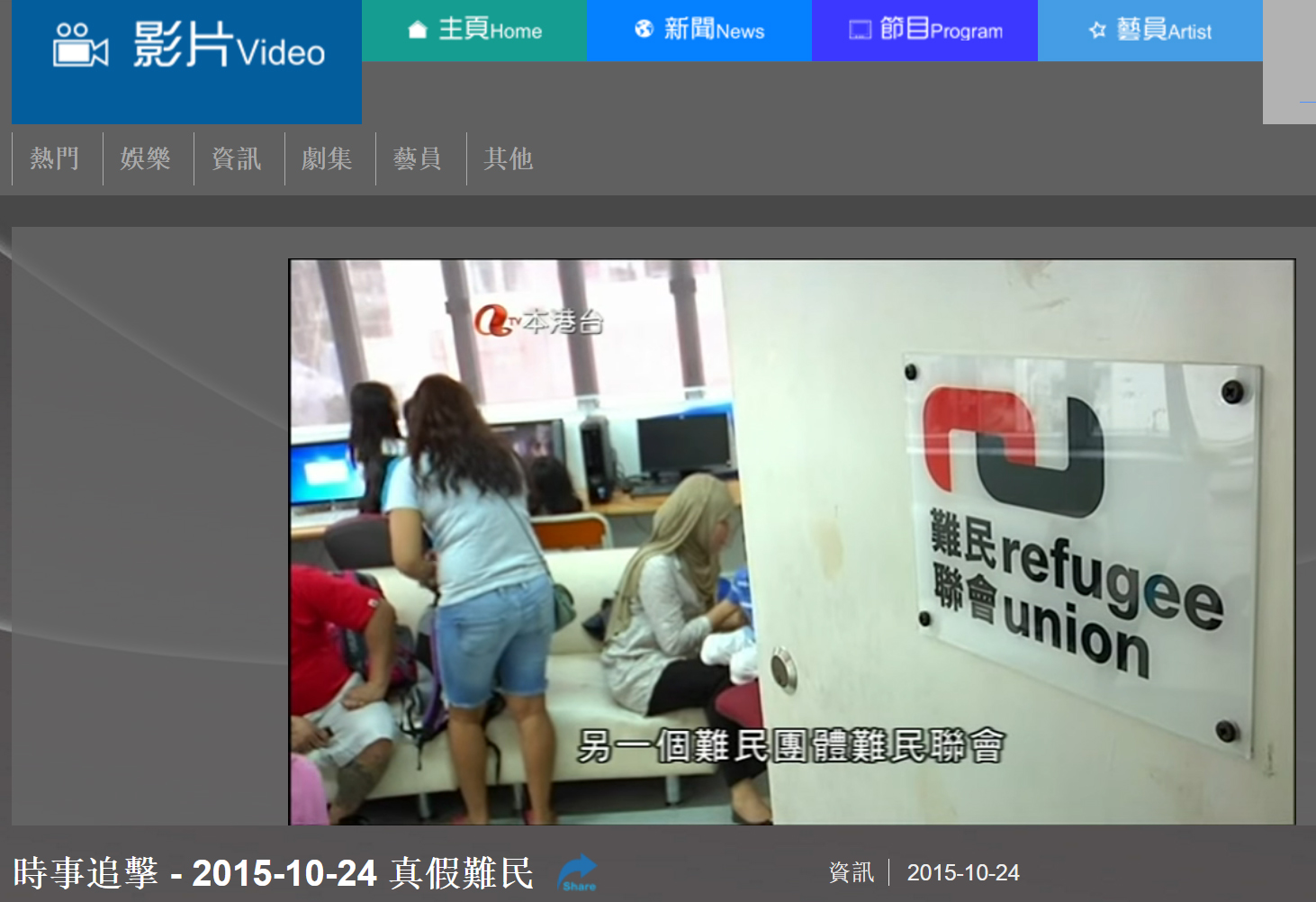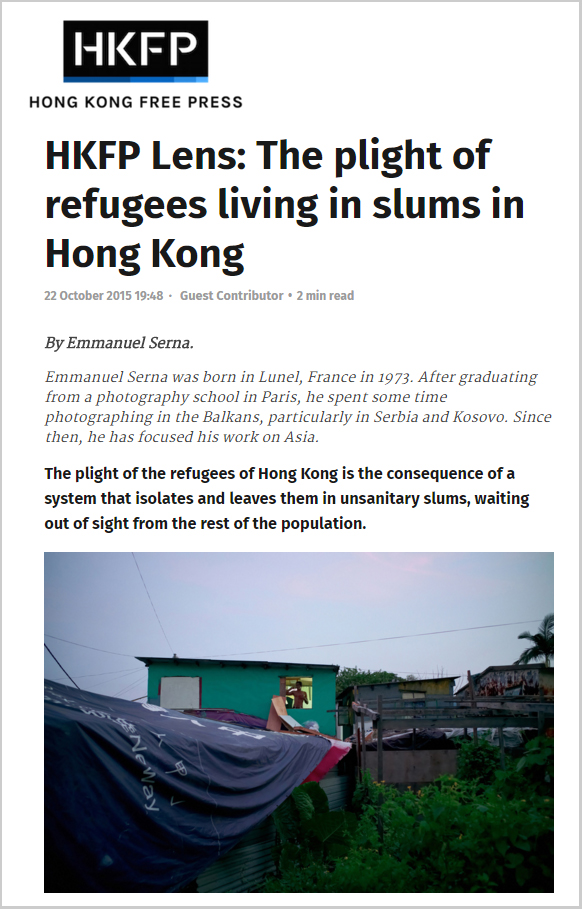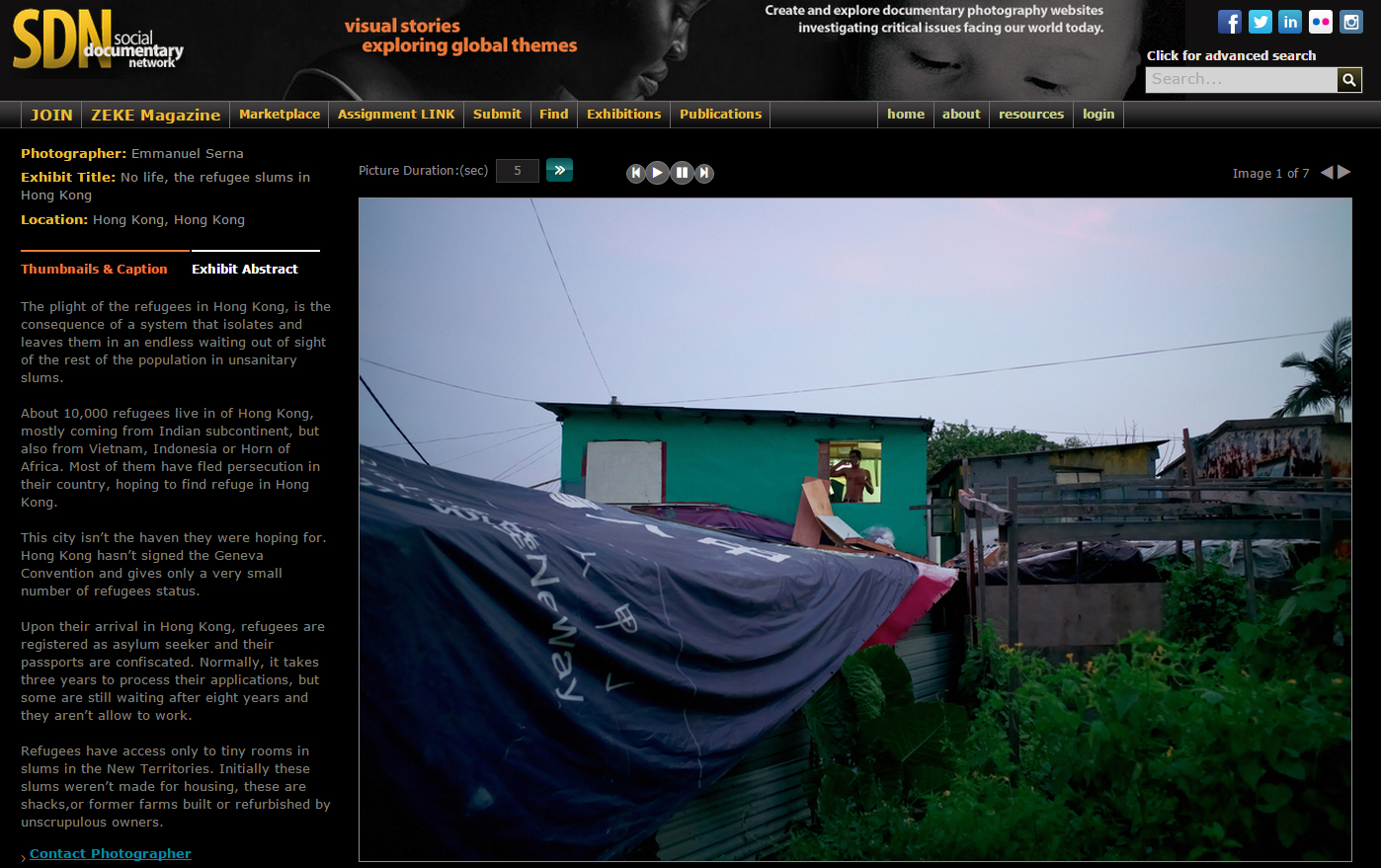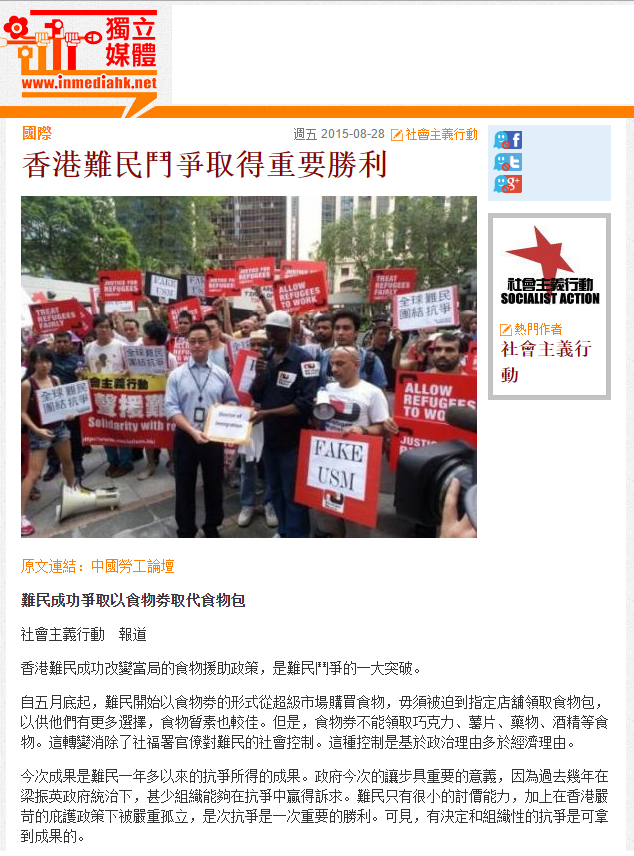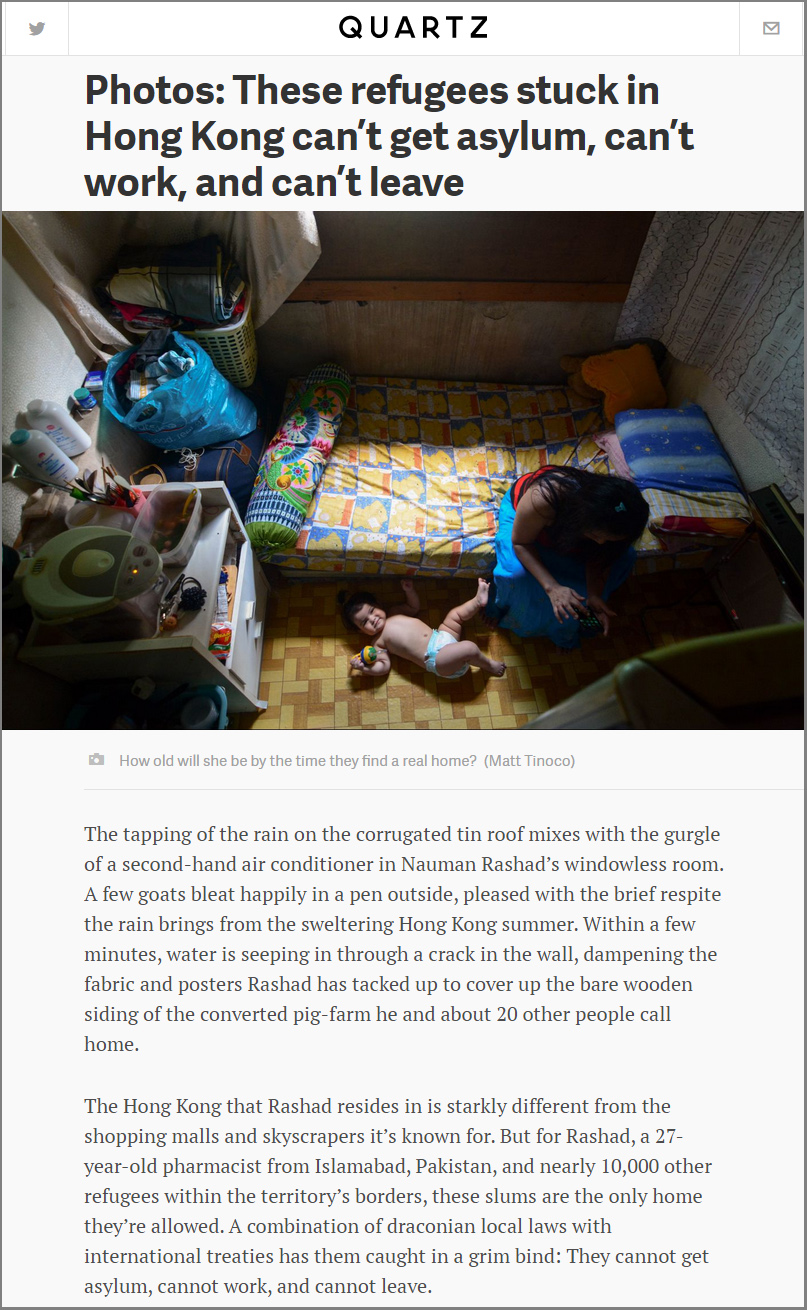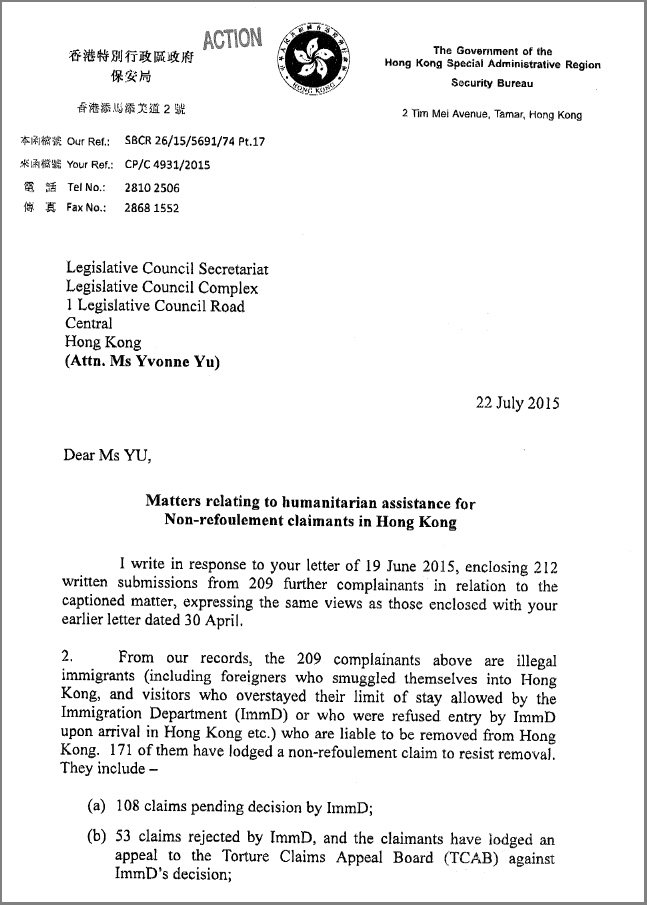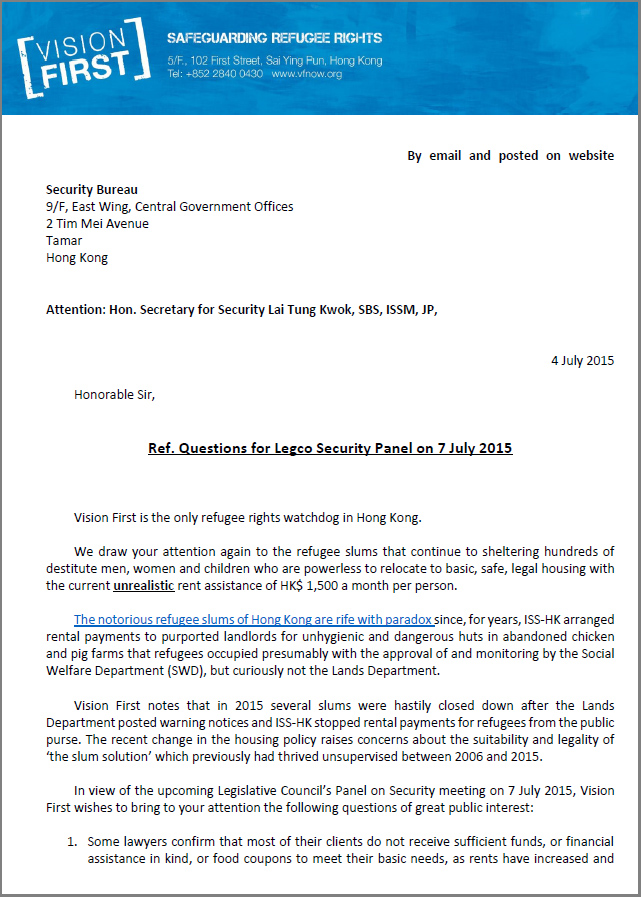Archive
ATV News Magazine “True and Fake Refugees”
Oct 26th, 2015 | Housing, Immigration, Media, Refugee Community, Rejection, Welfare | Comment
The plight of refugees living in slums
Oct 23rd, 2015 | Housing, Media, Refugee Community, Welfare | Comment
No life, the refugee slums in Hong Kong
Sep 19th, 2015 | Housing, Immigration, Media, Racism, Rejection, Welfare | Comment
The plight of the refugees in Hong Kong, is the consequence of a system that isolates and leaves them in an endless waiting out of sight of the rest of the population in unsanitary slums. About 10,000 refugees live in of Hong Kong, mostly coming from Indian subcontinent, but also from Vietnam, Indonesia or Horn of Africa.
Most of them have fled persecution in their country, hoping to find refuge in Hong Kong. This city isn’t the haven they were hoping for. Hong Kong hasn’t signed the Geneva Convention and gives only a very small number of refugees status. Upon their arrival in Hong Kong, refugees are registered as asylum seeker and their passports are confiscated.
Normally, it takes three years to process their applications, but some are still waiting after eight years and they aren’t allow to work. Refugees have access only to tiny rooms in slums in the New Territories. Initially these slums weren’t made for housing, these are shacks,or former farms built or refurbished by unscrupulous owners.
List of 69 refugee slums exposed by Vision First since March 2013
A little empathy goes a long way
Sep 18th, 2015 | Housing, Welfare | Comment
Let us praise ISS-HK for promptly remedying a tense situation.
This week a distressed refugee couple requested our assistance after the ceiling collapsed in their room and they became homeless. The welfare policy for refugees offers a subsidy ($1500 a month) for premises rented directly from landlords through estate agents familiar with the ISS-HK procedure. In this case the couple had renewed the contract in February 2015 and were paying $200 a month on top of $3000 paid by ISS-HK to the landlord.
However, a lack of proper maintenance of the old and dilapidated building in To Kwa Wan caused the partial collapse of the ceiling. Refugees are forced to live in the cheapest rooms, often in the oldest walk-up buildings, if not in slums, where sudden structural damage might puts their lives at risk.
In this case, fortunately the refugee couple was unhurt. The landlord visited briefly, but, unconcerned about the welfare of his tenants, disappeared soon after and disconnected his phone. The couple felt bound by the Tenancy Agreement and was unsure about their obligations towards the landlord. With no money, nowhere to stay and food coupons damaged by the rain, the couple called their ISS-HK case officer for assistance.
The wife reported to Vision First that, on several occasions, she called their case officer asking for assistance. She complained that she was dismissed with remarks to the following effect: “I don’t have time”, “This is your problem, I cannot help you”, “I don’t care about your problem. I have many clients (to assist)”, “I am busy. Don’t come (to ISS-HK office). I will not see you”, “I will not visit (the room) because the building is dangerous”, “If you don’t like it, go back to your country.” After which the ISS-HK case-worker would hang up the phone
With dignity and composure, the wife explained to Vision First that death threats had driven her into exile, as if she needed to justify her vulnerability after being insulted by a professional tasked with and paid for her welfare. She was evidently less distressed by the inability to offer emergency accommodation, than by the crude and unwarranted remark: “Go back to your country!”
Vision First raised a complaint with ISS-HK and the same afternoon her case officer called the wife to remedy the situation. The thankful lady reported to Vision First, “My case officer said that she understood my situation and was sorry. She promised to do her best and asked me to collect dried food (emergency rations) and go to the office on Monday. I was very surprised when she gave me her mobile number and asked me to call if I needed anything.”
Irrespective of the inevitable difficulties and frustrations faced in our work, we are reminded that refugees are human beings who deserve to be treated with dignity. The principle that “every asylum claim ought to be approach as genuine until it is proven that it cannot be substantiated by the claimant,” makes any dismissive remark highly unattractive.
It is worth repeating that the High Court directed that, “a refugee claimant deserve sympathy and should not be left in a destitute state during the determination of his status. However, his basic needs such as accommodation, food, clothing and medical care are provided by the Government.”
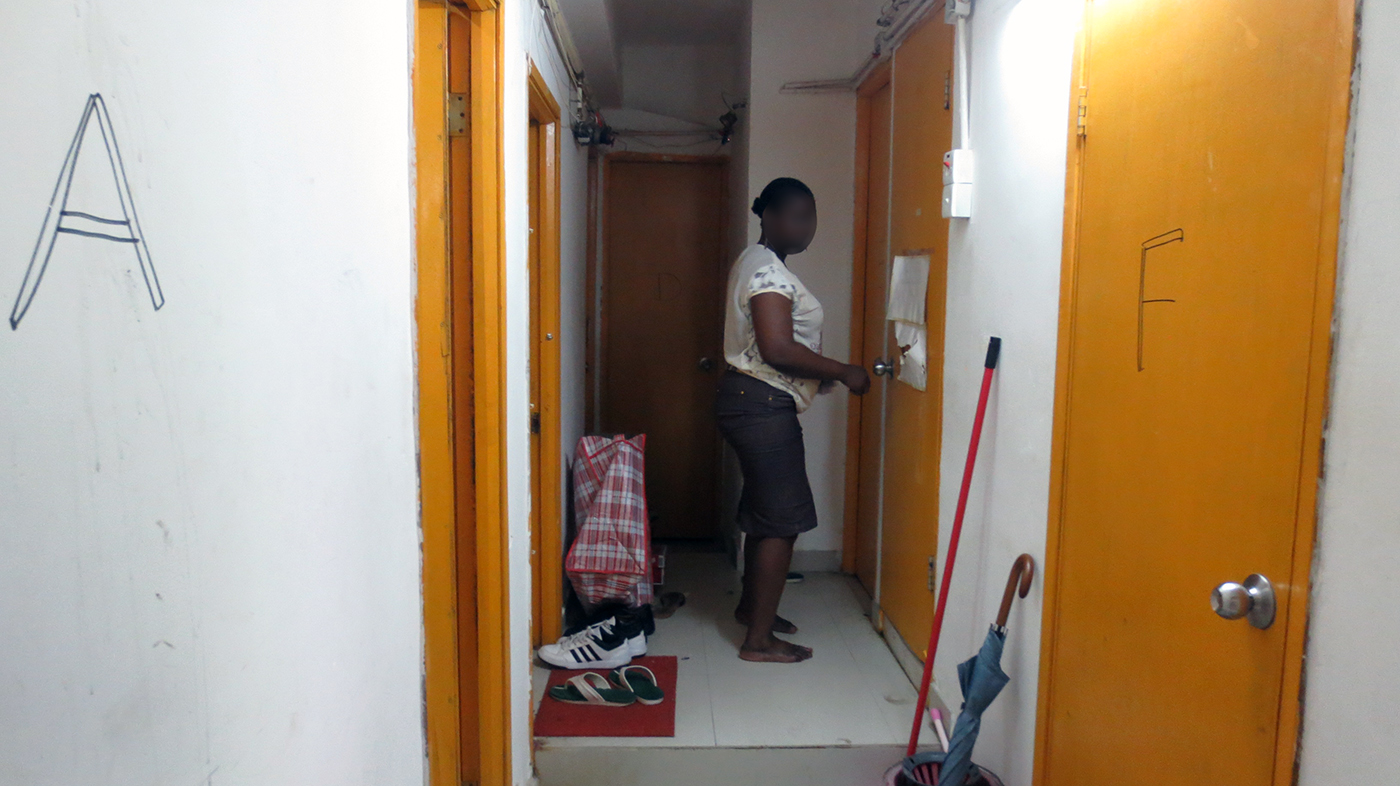
A tale of two cities – fabulously wealthy or agonizingly destitute?
Aug 18th, 2015 | Advocacy, Food, Housing, Refugee Community, Welfare | Comment
The police arrived to mediate the stand-off in what has regrettably become an all too frequent scene at the headquarters of the Social Welfare Department, the department entrusted with the physical wellbeing of about 10,000 refugees in the city. After listening to complaints, a community relations officer called out, “How many people are homeless?”
What happened next was symptomatic of the sickness that pervades our society – unnoticed and unassisted the poor agonize among the affluent. In the overcrowded and guarded lobby of the SWD, 20 unintimidated men and women raised a hand. “Homeless people are a crime risk as they might commit offenses out of desperation,” a concerned police officer whispered.
Nevertheless, this warning appears to be largely ignored in the offices of the Security Bureau, the mastermind behind refugee policies in Hong Kong. This semi-autonomous global city follows a precept that is plainly depicted in its distrust towards the poor that frequently makes the news.
Two visitors recently arrived in Hong Kong. One was the business magnate Jack Ma, the richest man in China and founder of the fabled e-commerce company Alibaba. The other was the less prominent Jagadeep, who claims to be a victim of the “corruption that is eating away at India like a termite and is coming from the top”, as Indian Premier Modi lamented. Two visitors with two experiences worlds apart.
It was reported in the press that Jack Ma purchased a fabulous home on Hong Kong’s Peak for an eye-watering HK$1.5 Billion – the second most expensive property purchase in the history of the city. Government rules and regulations facilitate the entry into Hong Kong for the wealthy, who are shamelessly feted and encouraged to spend, purchase and invest to their heart’s content.
Jagadeep’s experience was less wonderful and included several weeks of homelessness. He was granted a one week visa which he was obliged to overstay to seek asylum, thus committing his first offense. He was then detained for a month and pressured to depart by the Immigration that is struggling with 10,059 asylum seekers shamefully homogenized into a melting pot of distrust, vilification and rejection.
It is a tale of two cities. Jack Ma surely deserves to enjoy the fruits of his success from the balcony of his new mansion overlooking Victoria Harbour. Part of his purchasing price was HK$12,750,000 in stamp duty paid into government coffers to fund policies that include the Social Welfare Department’s “Provision of Assistance-in-kind for Asylum Seekers and Torture Claimants”.
Like an anxious billionaire terrified of becoming poor in 20 years, Hong Kong Government is obsessed with hoarding HK$734 Billion in fiscal reserves and abstaining from alleviating poverty among those who today don’t have food and shelter. Shoulder to shoulder with 1.3 million impoverished Hongkongers, stand Jagadeep and 10,000 refugees who “we will continue to ensure do not fall destitute whilst in Hong Kong,” claims misleadingly the Security Bureau.
One of a hundred refugees who protested on 17 August 2015 at the SWD head-office begs to disagree, “The government pretends not to see our suffering. But they know our needs and our pain. They created this system. They know $1500 is not enough for rent in this expensive city. They know $1200 is not enough to eat for a month. They use (policies) to oppress refugees.”
A Refugee Union leader, who claims his basic needs are not met, exclaimed, “The government says we are not allowed to work. They say they give us enough rent and enough food, but they are lying. They delay (decisions on) our claims for 10 years and keep us here. We are dying. Hungry people are angry people. You can go ahead and lock all of us in jail. What difference does it make?”
More angry voices would not be suppressed: “You see our children? We are in starvation. You make us suffer”, “Hong Kong pretends to be an international city, but this is a ghost city”, “They just pay for a system that abuses and rejects refugees”, “They know what is wrong, they know what is right, but they are not thinking about us”, “You can drink our blood, but drink it small and don’t kill us!”
“We will fight for our rights until there is change” promised an empowered Refugee Union member. But Vision First has serious reservations this is achievable in the near future. It is heartbreakingly obvious that Hong Kong Government turns a blind eye to the destitute, resident and otherwise, while crushing refugees behind bureaucratic lies supported by preposterous assurance that nobody will fall destitute while seeking asylum in the city that Jack Ma loves.
Refugees stuck in Hong Kong can’t get asylum, can’t work, and can’t leave
Aug 17th, 2015 | Crime, Food, Housing, Immigration, Media, Rejection, Welfare | Comment
Security Bureau response to 500 complaint letters to the LegCo
Aug 17th, 2015 | Food, Government, Housing, Refugee Community, Welfare | Comment
Security Bureau replied to the Legislative Council Secretariat concerning 500 complaints letters lodged by members of the Refugee Union on the inadequacy of welfare support.
“Foreigners who smuggled themselves into Hong Kong, and visitors who overstayed their limit of stay allowed by the Immigration Department (ImmD) or who were refused entry by the ImmD upon arrival at Hong Kong (collectively “illegal immigrants”) are subject to be removed from Hong Kong in accordance with the Immigration Ordinance (Cap. 115). To safeguard immigration control and for public interest, they should be removed as soon as practicable.”
“Some non-refoulement claimants may not be able to meet their basic needs when their claim is being assessed. Since 2006, on humanitarian grounds, the Government has been offering in-kind assistance to these claimants to prevent them from becoming destitute (the assistance programme). Coverage of such assistance includes temporary accommodation, basic utilities allowance, food, clothing, basic necessities, appropriate transport allowance and counseling activities … The Government has enhanced the service package … since February 2014:
- Accommodation: the rent allowance grid per adult claimants has been increased to $1,500;
- Food: the budget for food for each claimant has been increased to $1,200 a month;
- Utilities: the allowance per claimant has been increased to $300 per month;
- Transport allowance: the allowance per claimant has been increased from $200 t0 $420 per month.”
“We will carefully consider all the views received, including the concerns expressed in the 291 + 209 cases enclosed in your letter, with a view to ensuring that the non-refoulement claims are screened in a fair and expeditious manner and deterring illegal immigrants and abuses to our current system. Meanwhile, we will continue to ensure claimants do not fall destitute whilst in Hong Kong.” (emphasis added)
Legislative Council report on complaint mechanism, dated 10 August 2015
Inside prison I work for the government
Jul 22nd, 2015 | Crime, Housing, Immigration, Personal Experiences, Welfare | Comment
I am scarred because I don’t want to go back to prison. I was sentenced to 15 months for working to support my family, but I didn’t do anything criminal. In my mind, it was political persecution because refugees don’t have a straight road to walk. We go the wrong way because we don’t get enough assistance. We work to pay rent and buy food, but the police arrest us for “unlawful employment”.
I am a South Asian refugee mother with two daughters. Honestly I tell you, it is impossible for us to live with 3000$ rent and food coupons. Refugees need cash for many things, like going to the market and buying Pampers, clothes and school supplies. That is why we must do part-time job for our families in the day to day struggle. Also, my mother back home is sick, but I have no money to help.
In 2012, I was arrested at a fish restaurant in Tuen Mun. The police catch me and my offence is taking unlawful employment. Now I wish to unburden myself and tell the truth that the judge did not consider. The ISS assistance did not pay my full rent and utilities. I have no husband so I have to worry about my girls and everything I have to buy for them. That is why I have to do work before and now.
I tell my problems to my case officer but she cannot help. “This is the rules”, she always tells me so I know that I have to find a way by myself. If the landlord kick us outside, what will happen to my girls? My friend introduced me to a boss who paid me 400$ to wash dishes all day. There is other work for women, but it is not acceptable for me because it is very dangerous and I have children.
Why inside prison have so many refugees working? Many resident prisoners refuse to work, or have mental problems, or do drugs before. Refugees are strong and hard-working. Inside prison we work for the Government of Hong Kong, for example, washing and ironing uniforms and hospital sheets. They pay us 5$ a day and get cheap labour from thousands of men and women refugees who cannot work outside. Why does it happen like this?
Before I am outside and I work for my family. When police catch me they send me to prison. Then I am inside prison and I work for the government. But still I am working: outside it was illegal because I cannot help the government, but inside it is legal because I can help the government. Would it be fairer for Immigration to let refugees work outside to buy what we need and not do crime?
Inside prison I cannot refuse to work because the officers shout at me. I must do the jobs that they give me all the morning and afternoon, also on Sunday. So please tell me if this is fair to refugees? Outside I cannot do work, but must survive without enough assistance. Inside I must do work like a slave for the Government for 15 months without a holiday and without choice. Is this right?
I don’t want to go back to prison. The police tell me that if catch again, next time they will fine me 50,000$ and put three years in prison. Now I don’t know how I can buy something that my daughters need. Every day and night I am going mentally sick and depression. Refugees are always scared of going to prison, even if their children are born on Hong Kong land and never see their parents’ country.
Also refugees have dreams for their future. I want a safe and healthy life for my children. I want them to be happy and not suffer like this. But what can I offer them? We cannot go back to my country and Hong Kong does not let us stay. I dream of a better future when I can do something good for children, because today they suffer too much.
